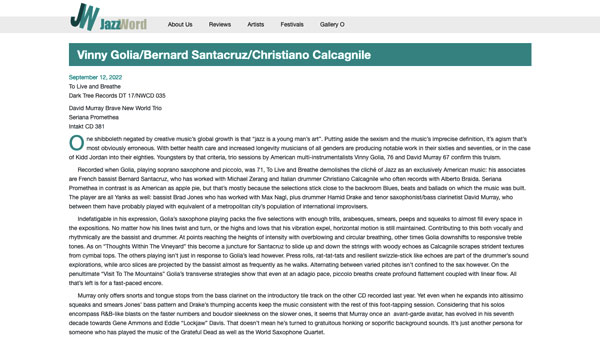• Ken Waxman // JazzWord (12 septembre 2022)
To Live and Breathe
Dark Tree Records DT 17/NWCD 035
David Murray Brave New World Trio
Seriana Promethea
Intakt CD 381
One shibboleth negated by creative music’s global growth is that “jazz is a young man’s art”. Putting aside the sexism and the music’s imprecise definition, it’s agism that’s most obviously erroneous. With better health care and increased longevity musicians of all genders are producing notable work in their sixties and seventies, or in the case of Kidd Jordan into their eighties. Youngsters by that criteria, trio sessions by American multi-instrumentalists Vinny Golia, 76 and David Murray 67 confirm this truism.
Recorded when Golia, playing soprano saxophone and piccolo, was 71, To Live and Breathe demolishes the cliché of Jazz as an exclusively American music: his associates are French bassist Bernard Santacruz, who has worked with Michael Zerang and Italian drummer Christiano Calcagnile who often records with Alberto Braida. Seriana Promethea in contrast is as American as apple pie, but that’s mostly because the selections stick close to the backroom Blues, beats and ballads on which the music was built. The player are all Yanks as well: bassist Brad Jones who has worked with Max Nagl, plus drummer Hamid Drake and tenor saxophonist/bass clarinetist David Murray, who between them have probably played with equivalent of a metropolitan city’s population of international improvisers.
Indefatigable in his expression, Golia’s saxophone playing packs the five selections with enough trills, arabesques, smears, peeps and squeaks to almost fill every space in the expositions. No matter how his lines twist and turn, or the highs and lows that his vibration expel, horizontal motion is still maintained. Contributing to this both vocally and rhythmically are the bassist and drummer. At points reaching the heights of intensity with overblowing and circular breathing, other times Golia downshifts to responsive treble tones. As on “Thoughts Within The Vineyard” this become a juncture for Santacruz to slide up and down the strings with woody echoes as Calcagnile scrapes strident textures from cymbal tops. The others playing isn’t just in response to Golia’s lead however. Press rolls, rat-tat-tats and resilient swizzle-stick like echoes are part of the drummer’s sound explorations, while arco slices are projected by the bassist almost as frequently as he walks. Alternating between varied pitches isn’t confined to the sax however. On the penultimate “Visit To The Mountains” Golia’s transverse strategies show that even at an adagio pace, piccolo breaths create profound flattement coupled with linear flow. All that’s left is for a fast-paced encore.
Murray only offers snorts and tongue stops from the bass clarinet on the introductory tile track on the other CD recorded last year. Yet even when he expands into altissimo squeaks and smears Jones’ bass pattern and Drake’s thumping accents keep the music consistent with the rest of this foot-tapping session. Considering that his solos encompass R&B-like blasts on the faster numbers and boudoir sleekness on the slower ones, it seems that Murray once an avant-garde avatar, has evolved in his seventh decade towards Gene Ammons and Eddie “Lockjaw” Davis. That doesn’t mean he’s turned to gratuitous honking or soporific background sounds. It’s just another persona for someone who has played the music of the Grateful Dead as well as the World Saxophone Quartet.
Influences from the Blues (“Rainbows for Julia”), Latin (“Switchin’ in the Kitchen”) and mellow nightlife (“Anita et Annita”) informs the album, which also includes a Sly Stone cover and a final tune that could be played at a funky honky-tonk. There’s more to it though. Jones’ skills encompass sul tasto introductions and power pumps; while Drake’s cymbal crashes and backbeat can adapt to many situations. On the first example, his well-measured thumps mate Jones’ sympathetic strums, while Murray’s cries maintain the basic melody. A straightforward strolling pattern from the two keep the stop-time Latin tinge from exploding as Murray soars from spetrofluctuation and slaps tones to doits and smears while expressing speedy sheets of sound. As for “Anita et Annita”, at points the mellow saxophone narrative gives way to an allegro line that could be one of Sonny Rollins’ West Indian affiliations.
At 92 Rollins has slowed down from his nearly constant touring and high-quality recording of the preceding 70 plus years. Looks like Murray and Golia aren’t yet ready to do the same thing, at least on the evidence here.
• • • • • • • • • • • • • • • • • • • • • • • • • • • • • • • • • • • • • • • • • • • • • • • • • • • • • • • • • • • • • • • •

Sorry, the comment form is closed at this time.